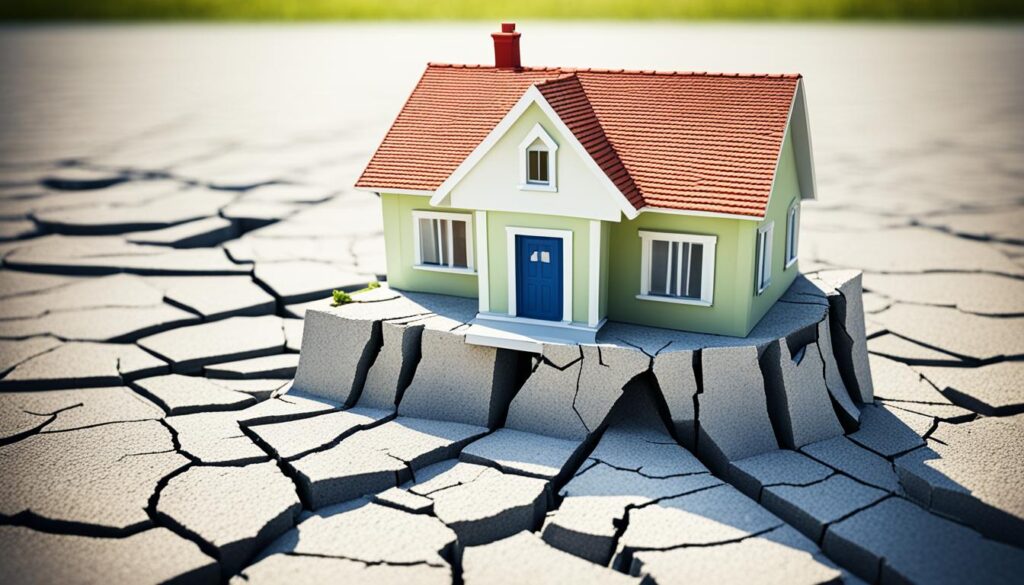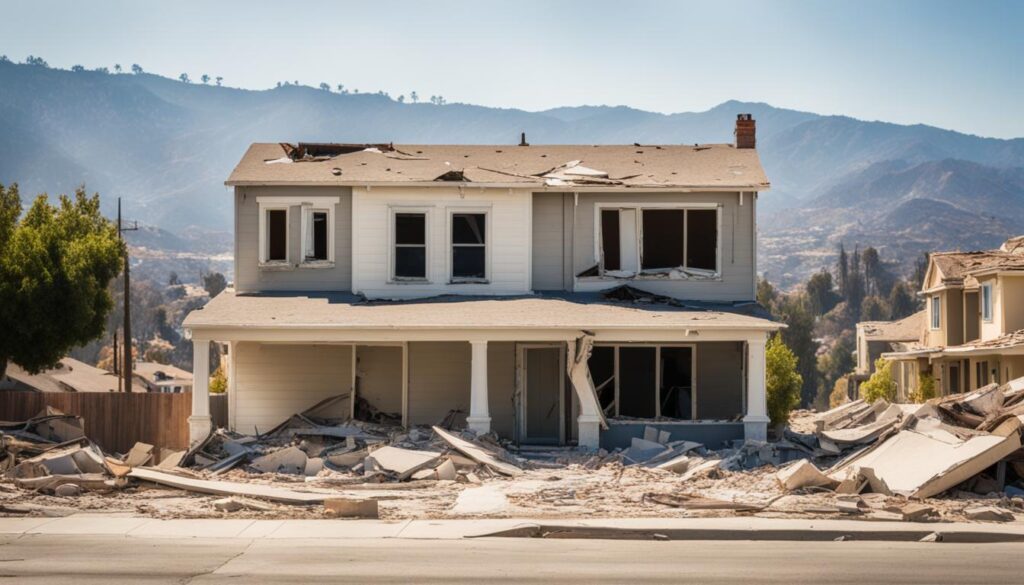Home Insurance With Earthquake Coverage almost half of all Americans are at risk for damage from an earthquake, according to the most recent report from the United States Geological Survey. Unfortunately, damage caused by an earthquake is a common exclusion for homeowners insurance, condo and renters insurance policies. If you want coverage for earthquake damage, you can purchase an earthquake insurance policy. Before you buy a policy, make sure to read it closely. There are typically a lot of exclusions and limits on earthquake coverage, which should give you pause.
Key Takeaways: Home Insurance With Earthquake Coverage
- Earthquake insurance is essential for homeowners, condo owners, and renters living in earthquake-prone areas.
- Standard homeowners insurance policies do not cover damage caused by an earthquake.
- Read the earthquake insurance policy carefully to understand the coverage, exclusions, and limits.
- Determine the appropriate earthquake insurance coverage limits based on factors such as the cost to rebuild your home and replace personal property.
- Consider factors such as location, age of the home, and cost to rebuild when calculating the cost of earthquake insurance.
What Is Earthquake Insurance?
Earthquake insurance provides essential coverage for homeowners and renters in the event of an earthquake. Unlike standard homeowners insurance or renters insurance policies, earthquake insurance specifically safeguards your home and belongings from earthquake-related damage or destruction. It is essential to note that earthquakes are not covered by hazard insurance, meaning without earthquake insurance, you will bear the full cost of repairing any earthquake damage to your house.
Earthquake insurance acts as a critical safeguard, providing financial protection when disaster strikes. By investing in earthquake insurance, homeowners and renters can ensure that they are not burdened with substantial financial expenses in the aftermath of an earthquake.
“Earthquake insurance is a lifeline for homeowners and renters, offering peace of mind and financial resilience in the face of seismic calamity.”
Protecting your property and belongings from the unpredictable nature of earthquakes is a wise choice, particularly if you reside in an area prone to seismic activity. While a standard homeowners insurance policy may provide coverage for certain perils, such as fire or theft, it does not extend to damage caused by earthquakes. This is where earthquake insurance steps in, bridging the coverage gap and ensuring you have the necessary financial support to rebuild and recover.
Whether you are a homeowner or a renter, earthquake insurance is an invaluable shield against the immense financial strain that can follow an earthquake. With earthquake insurance in place, you can rest assured that your home and belongings are protected, allowing you to focus on restoring normalcy in your life.
Why Is Earthquake Insurance Essential for Homeowners and Renters?
Homeowners insurance policies typically exclude coverage for earthquake damage, meaning if you don’t have earthquake insurance and your house sustains damage during an earthquake, you will be responsible for covering all repair costs. This can place a significant financial burden on homeowners, potentially leading to financial distress as they try to rebuild their lives and properties in the aftermath.
For renters, earthquake insurance is equally crucial. While a landlord’s insurance may cover the physical structure of the building, it generally does not protect a renter’s personal belongings in the event of an earthquake. By securing earthquake insurance, renters can ensure the safety and protection of their personal property, taking their financial well-being into their own hands.
Ultimately, earthquake insurance offers homeowners and renters the peace of mind and financial security they need to face any seismic eventuality.
What Does Earthquake Insurance Cover?
Earthquake insurance provides coverage for various aspects of your property and living expenses in the event of earthquake damage. Understanding the specific coverage offered by earthquake insurance can help you determine if it is the right choice for you. Here’s what earthquake insurance typically covers:
Dwelling Coverage
Earthquake insurance includes coverage for your dwelling, which refers to your house and the structures attached to it, such as garages. If these structures are damaged or destroyed during an earthquake, your insurance policy can help cover the cost of repairs or rebuilding.
Other Structures
In addition to your dwelling, earthquake insurance can also cover other structures on your property, such as detached garages, sheds, fences, or even swimming pools. This ensures that damage to such structures caused by an earthquake is included in your coverage.
Personal Property
Your personal property, including furniture, appliances, electronics, and other belongings, can be protected by earthquake insurance. In the event of earthquake damage, your policy can help reimburse you for the cost of repairing or replacing these items.
Additional Living Expenses
If your home becomes uninhabitable due to earthquake damage and you need to temporarily live elsewhere, earthquake insurance can provide coverage for additional living expenses. This can include the cost of temporary accommodations, meals, and other necessary expenses while your home is being repaired or rebuilt.
It’s important to review the terms and limits of your earthquake insurance policy to fully understand the extent of coverage offered. Different insurance providers may have variations in coverage details, so reading the policy carefully is essential. By having earthquake insurance in place, you can have peace of mind knowing that your property and belongings are protected in the event of an earthquake.
What’s Not Covered by Earthquake Insurance?
While earthquake insurance provides coverage for many aspects of earthquake damage, there are certain items that are typically excluded from coverage. It’s important to review your policy carefully to understand what is and isn’t covered. Here are some common exclusions:
Excluded Items:
- Water supply systems: Damage to water pipes, wells, or other water supply systems is generally not covered.
- Underground structures: This includes damage to underground basements, tunnels, or other underground structures.
- Exterior masonry veneer: Damages to exterior masonry veneer, such as brick or stone facades, may not be covered by earthquake insurance.
- Personal property located outside of the dwelling: Items like outdoor furniture, landscaping, or other personal property located outside of the main dwelling may not be covered.
- Other items: Certain additional items, such as swimming pools and motor vehicles, may also be excluded from coverage.
It’s important to note that coverage can vary depending on your specific policy and insurance provider. If you have any questions or concerns about the exclusions in your earthquake insurance policy, it’s recommended to contact your insurance agent for clarification.
Do I Need Earthquake Insurance?
While living in an earthquake-prone area doesn’t necessitate the ownership of earthquake insurance, it is a sensible consideration. Earthquakes can occur in all 50 states, making it important to assess the need for earthquake insurance regardless of your location. Although not mandatory by mortgage lenders or HOA associations, earthquake insurance provides financial protection against potential damage caused by seismic activity, giving you peace of mind.
“Earthquakes can happen anytime and anywhere, so having earthquake insurance can help mitigate the financial impact of such a catastrophic event.”
To determine the risk of earthquakes in your area, you can consult the Modified Mercalli Intensity Scale. This scale evaluates the severity of earthquakes based on observed shaking and resulting damage. It can provide valuable insights into the earthquake-prone areas within your region and help you assess the need for earthquake insurance.
Protecting your assets, such as your home and personal belongings, is important, especially in regions with a higher risk of seismic activity. By obtaining earthquake insurance, you safeguard your investment and ensure you have the necessary financial resources to rebuild and replace damaged or destroyed property in the event of an earthquake.
“Don’t wait for an earthquake to strike before considering earthquake insurance. Be proactive and prepare for the unexpected.”

| Benefits of Earthquake Insurance | Considerations |
|---|---|
|
|
How Much Earthquake Insurance Do I Need?
When it comes to determining the coverage limit for earthquake insurance, several factors need to be considered. To ensure adequate protection, it’s essential to evaluate the cost of rebuilding your house, replacing personal property, and covering additional living expenses in the event of an earthquake.
Working closely with your insurance company is crucial during this process. They can provide valuable insights and guidance to help you determine the appropriate coverage limits for your earthquake insurance policy. By considering these factors and collaborating with your insurance provider, you can ensure that you have the right level of protection against earthquake-related losses.
Factors to Consider for Determining Coverage Limits
- Cost to Rebuild Your House: Assessing the cost of rebuilding your house is essential for determining the dwelling coverage portion of your earthquake insurance. Factors such as the size of your home, construction materials, and labor costs can influence the rebuilding expenses.
- Replacement of Personal Property: Evaluating the value of your personal belongings is crucial for determining the personal property coverage in your earthquake insurance policy. Take an inventory of your possessions, including furniture, appliances, electronics, and valuable items, to estimate the replacement cost.
- Additional Living Expenses: In the unfortunate event that your house becomes uninhabitable due to earthquake damage, additional living expenses coverage can provide financial support for temporary accommodation, meals, and other necessary expenses. Consider factors such as the duration of displacement and the cost of living in your area when determining this coverage.
By carefully assessing these factors and collaborating with your insurance company, you can ensure that your earthquake insurance coverage adequately protects your home, personal property, and living expenses in the event of an earthquake.
Remember, each person’s insurance needs may vary based on their specific circumstances. Consulting with an insurance professional can provide personalized recommendations tailored to your situation.

| Coverage Considerations | Tips |
|---|---|
| Cost to Rebuild Your House | Obtain a professional assessment of the rebuilding cost specific to your property. |
| Replacement of Personal Property | Create a detailed inventory and consider the replacement cost of your belongings. |
| Additional Living Expenses | Research the cost of temporary accommodations and living expenses in your area to estimate the coverage needed. |
California Earthquake Insurance
In California, earthquake insurance is a crucial consideration for homeowners in order to protect their properties and belongings. When you purchase homeowners insurance in California, insurance companies are required to offer earthquake insurance as well.
“Earthquake insurance provides financial security for homeowners in earthquake-prone regions.” – California Earthquake Authority
The California Earthquake Authority (CEA) is an important entity that offers earthquake insurance policies for residential properties throughout the state. While you cannot purchase a policy directly from the CEA, you can obtain one through insurance companies that are members of the CEA.
The CEA offers an earthquake insurance premium calculator that can assist homeowners in determining the cost of coverage based on their specific circumstances. This valuable tool ensures that homeowners are able to understand and estimate the financial aspects of purchasing earthquake insurance in California.
| California Earthquake Insurance | Key Points |
|---|---|
| Purchase Requirement | California insurance companies are required to offer earthquake insurance when homeowners insurance is purchased. |
| Provider | The California Earthquake Authority (CEA) offers earthquake insurance policies for residential properties. |
| Purchase Process | Policies can be obtained through insurance companies that are members of the CEA. |
| Cost Assessment | The CEA provides an earthquake insurance premium calculator to determine the cost of coverage. |
With the assistance of the California Earthquake Authority and the earthquake insurance premium calculator, homeowners can make informed decisions about purchasing earthquake insurance in California. This crucial coverage provides financial protection and peace of mind in the event of an earthquake, ensuring that homeowners can rebuild and recover from the potential devastation.

How Much Does Earthquake Insurance Cost?
When considering earthquake insurance, one of the most important factors that homeowners, renters, and condo owners consider is the cost. Earthquake insurance rates can vary depending on several key factors, including the location of your home, the age of your home, and the cost to rebuild.
On average, earthquake insurance premiums range from $800 to $850 per year. However, it’s crucial to note that these rates may fluctuate based on individual circumstances and specific insurance policies. To ensure you find the best rate for your needs, it’s essential to shop around and compare quotes from different insurance companies.
By obtaining multiple quotes, you can evaluate the coverage options available to you and select a policy that provides the necessary protection at a competitive price. Remember, the cost of earthquake insurance is an investment in your financial security in the event of seismic activity.

“When it comes to earthquake insurance rates, it’s important for homeowners to understand that the cost of coverage is directly influenced by various factors, including geographic location and the level of risk.” – Michelle Thompson, insurance expert
Insurance companies consider the proximity of your home to fault lines and high-risk earthquake areas when determining premiums. Homes located in areas with a higher risk of earthquakes may have higher insurance rates due to the increased likelihood of damage.
In addition, the age of your home is a significant factor in determining earthquake insurance rates. Older homes may incur higher premiums because they may be more vulnerable to damage and cost more to repair or rebuild.
Understanding Earthquake Insurance Premiums
Earthquake insurance premiums are typically calculated based on a percentage of the coverage amount for your home and personal property. The average coverage limit is around $250,000 for the structure and $100,000 for personal belongings.
It’s important to note that earthquake insurance is subject to a deductible, which is the amount you must pay out of pocket before your insurance coverage kicks in. Deductibles for earthquake insurance policies can range from 10% to 20% of the coverage amount. Choosing a higher deductible can lower your premium but also means you’ll have a higher upfront cost in the event of a claim.
Insurance companies may also offer additional endorsements or riders that can be added to your policy for an increased premium. These endorsements provide extra coverage for specific items or scenarios that may not be covered under the standard policy.
When considering earthquake insurance, it’s crucial to carefully review the policy terms, coverage limits, exclusions, and any additional endorsements offered. This will help ensure that you have a clear understanding of the cost and the level of protection provided by the policy.
| Factors Influencing Earthquake Insurance Rates | Impact on Premiums |
|---|---|
| Location of your home | Higher-risk areas may result in higher premiums |
| Age of your home | Older homes may have higher premiums due to increased vulnerability |
| Cost to rebuild | Higher rebuild costs can lead to higher premiums |
As you can see, several factors influence earthquake insurance rates. By understanding these factors and shopping around for quotes, you can find a policy that fits your needs and budget while providing the necessary coverage in the event of an earthquake.
How to Save Money on Earthquake Insurance
When it comes to earthquake insurance, there are ways to save money without compromising on coverage. Consider these strategies:
- Choose a higher deductible: Opting for a higher deductible can lower your premiums. Earthquake insurance discounts are often available to policyholders who are willing to take on more of the financial risk themselves. Just make sure you have enough savings to cover the deductible in case of a claim.
- Look for discounts: Some insurance companies offer earthquake insurance discounts, so it’s worth shopping around and comparing quotes. These discounts may be available for various reasons, such as bundling your earthquake insurance with other policies or having certain safety features in your home.
- Consider a seismic retrofit: A seismic retrofit involves reinforcing your home to make it more resistant to earthquake damage. Some insurance companies offer discounts for homes that have undergone a seismic retrofit, as they are less likely to sustain severe damage in an earthquake. Consult with a professional to assess if a retrofit is a cost-effective option for your home.
Taking these steps can help you save money on earthquake insurance premiums while still ensuring adequate coverage for your home and belongings.
How to Get Earthquake Insurance
If you’re considering purchasing earthquake insurance, there are a few steps you can take to ensure you make an informed decision. Here is a guide on how to get earthquake insurance:
Contact Your Homeowners Insurance Company
Start by reaching out to your current homeowners insurance company and inquire about earthquake coverage. They will be able to provide you with more information about the options available to you, including any additional policies or endorsements you may need to purchase.
Shop Around for Quotes
It’s always a good idea to shop around and compare quotes from different insurance companies. By doing so, you can get a better understanding of the coverage and prices available to you. Keep in mind that earthquake insurance rates can vary, so take your time to find the best option for your needs and budget.
Read the Policy Carefully
Before making a decision, it’s crucial to read the earthquake insurance policy carefully. Pay close attention to the exclusions and limits outlined in the policy to ensure you have a clear understanding of what is covered and what is not. If you have any questions or concerns, don’t hesitate to reach out to the insurance company for clarification.
Also Read:- How Can You Find The Best Online Life Insurance Deals?
Remember, earthquake insurance is designed to provide financial protection in the event of an earthquake, so it’s essential to choose a policy that suits your specific needs and offers adequate coverage.

Securing earthquake insurance can provide you with peace of mind and protect your home and belongings in the event of a natural disaster. By following these steps and doing your research, you can ensure you make an informed decision when purchasing earthquake insurance.
Conclusion
In conclusion, earthquake insurance is an important consideration for homeowners, renters, and condo owners in earthquake-prone areas. It provides coverage for damage to your home and belongings that is not typically covered by standard insurance policies.
While the cost of earthquake insurance can be high, it can provide financial protection and peace of mind in the event of an earthquake. It’s crucial to carefully review your policy and understand the coverage and exclusions before purchasing.
By taking the time to evaluate your risk and calculate the need for earthquake insurance, you can make an informed decision about the coverage limits you need. Remember to compare quotes from different insurance providers to find the best rate and consider options for saving money, such as choosing a higher deductible or taking advantage of earthquake insurance discounts.
FAQs
Q: What is earthquake insurance?
A: Earthquake insurance is a type of insurance that provides coverage specifically for damages caused by earthquakes.
Q: Does my homeowners insurance policy cover earthquake damage?
A: In most cases, homeowners insurance does not cover earthquake damage. You would need a separate earthquake insurance policy for that.
Q: Why should I buy earthquake insurance?
A: Earthquakes can cause significant damage to your home, and earthquake insurance can help protect you from costly repairs and reconstruction.
Q: What is the California Earthquake Authority (CEA)?
A: The California Earthquake Authority (CEA) is a not-for-profit, privately funded organization that provides residential earthquake insurance policies in California.
Q: How do I know if I need earthquake insurance?
A: If you live near a fault line or in an earthquake-prone area, it is recommended to consider purchasing earthquake insurance to protect your home.
Q: What does earthquake insurance typically cover?
A: Earthquake insurance policies may cover earthquake damage to your home, personal belongings, additional living expenses, and sometimes even building code upgrade coverage.
Q: Can I purchase earthquake insurance as an add-on to my existing homeowners or renters insurance policy?
A: While some insurance companies offer earthquake coverage as an add-on, it is often recommended to purchase a separate earthquake policy for comprehensive coverage.
Q: How are insurance deductibles handled for earthquake insurance?
A: Earthquake insurance policies typically have higher deductibles than regular homeowners insurance policies, and they are often based on a percentage of the overall coverage amount,covered for earthquake damage,homeowners and renters insurance.
Q: How can I find out more about earthquake insurance options in California?
A: You can contact the California Earthquake Authority (CEA) or your insurance provider to inquire about earthquake insurance coverage options available to you in California,homeowners policy,cea earthquake.cea homeowners,major earthquake,cea earthquake,insurance must,earthquake claim,include earthquake,cea earthquake policy,strong earthquake,auto insurance policy,participating residential insurance.




